CBD and Testosterone: Boosting Myths or Harmful Truths?
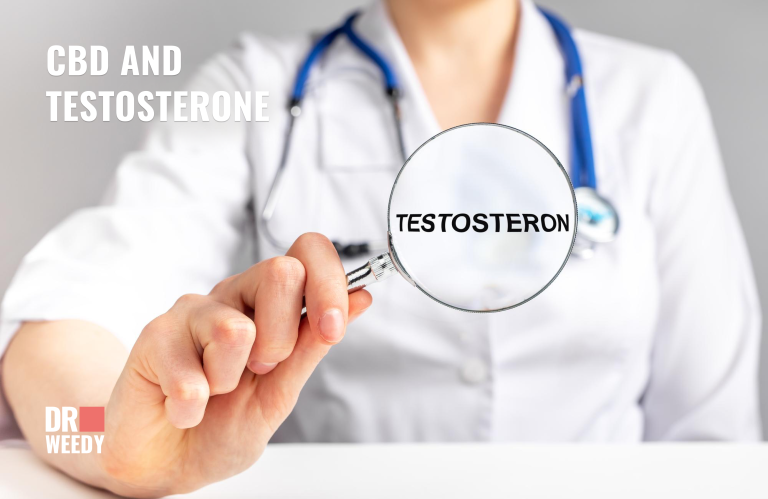
Testosterone plays a pivotal role in men’s health, encompassing reproductive function, body structure, and overall well-being. This significance often sparks interest among men regarding whether CBD can stimulate testosterone production or, conversely, suppress it. Before diving into the details of how CBD use affects testosterone levels, it’s essential to revisit the basics.
What is Testosterone?
Testosterone is a vital male hormone, primarily produced in the testicles. It’s responsible for the development of male secondary sexual characteristics such as a deeper voice, muscle growth, and facial hair. Furthermore, testosterone is crucial for sperm production, bone health, and fat distribution in the male body. Beyond these physical aspects, testosterone also influences mood, energy levels, and overall vitality in men.
Basic concepts: CBD, THC, and ECS
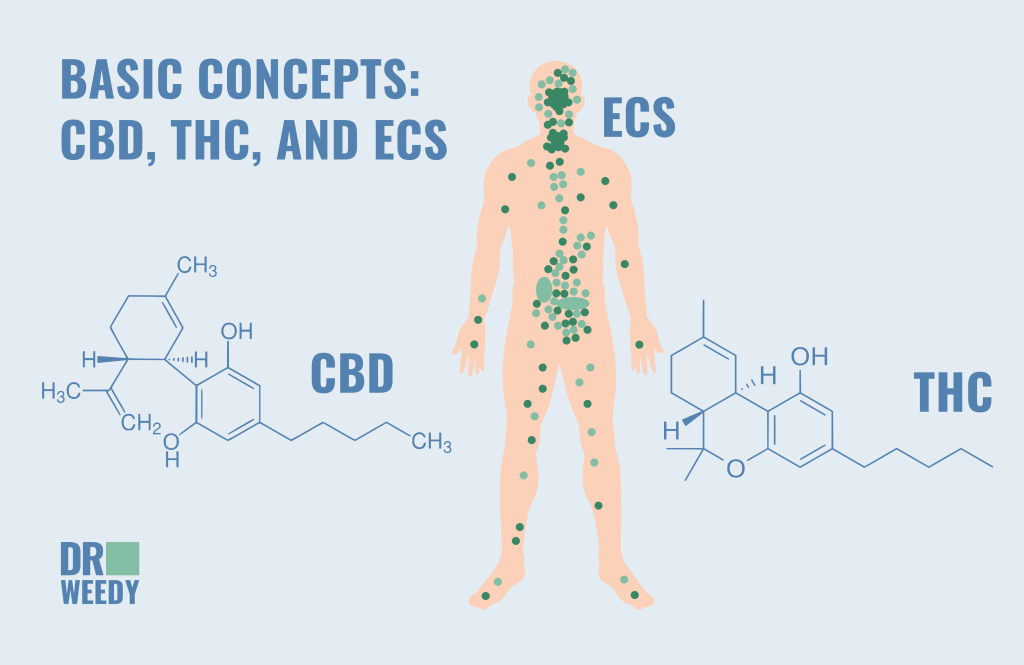
Starting from the 1940s, researchers made significant discoveries in succession. Roger Adams isolated the first cannabinoid: cannabidiol (CBD). Later, Raphael Mechoulam identified tetrahydrocannabinol (THC), the psychoactive component in marijuana responsible for its euphoric effects. Unlike THC, CBD doesn’t have a psychotropic effect. These findings spotlighted the significance of the endocannabinoid system (ECS), a vital signaling system in the body. The ECS comprises cannabinoid receptors (CB1 and CB2) that are integral to the functioning of the immune, nervous, and reproductive systems, as well as energy metabolism and cell division.
The paramountcy of the ECS in men’s health cannot be overstated, especially when considering that the human body is inherently equipped to engage with CBD. When introduced into the body, CBD interacts with its cannabinoid receptors.
How Do CBD and ECS Influence Testosterone?
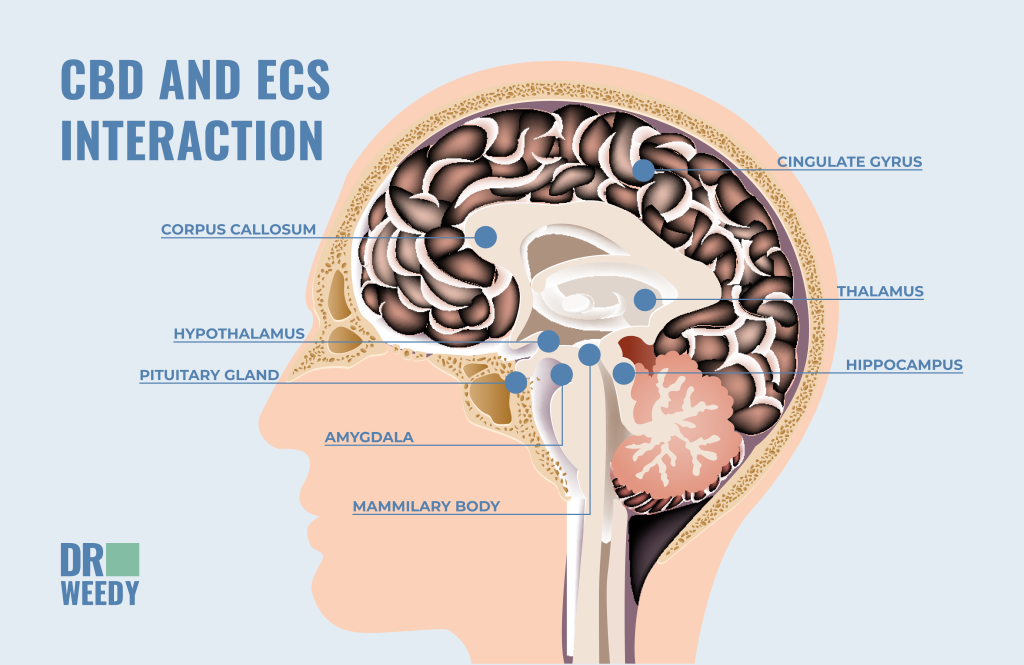
Now, to understand why the ECS affects testosterone production: ECS interacts directly with the hypothalamus and both the pituitary and adrenal glands. These glands orchestrate the production of this essential male hormone. The hypothalamus signals the pituitary gland to activate the luteinizing hormone (LH). In turn, LH stimulates the Leydig (interstitial) cells responsible for testosterone synthesis. Cannabinoid receptors are present in Leydig cells, sperm cells, and the pituitary gland, thereby influencing testosterone production.
Besides direct interaction, CBD can limit the production of prolactin and cortisol hormones, which in turn can slow down testosterone production. The fact is that both of these neurotransmitters are produced in your body in response to different types of stress:
- Mental stress (due to regular anxiety disorders, insomnia, etc.);
- Physical stress (for example, after an intense gym workout or heavy physical activity);
- Positive stress (when positive emotions bring anxiety);
- Negative stress (when there is a feeling of oppression, fear, or insecurity).
CBD is known for its relaxing effects. Therefore, cannabidiol promotes the proper balance of testosterone levels in the body.
How CBD Can Boost Testosterone
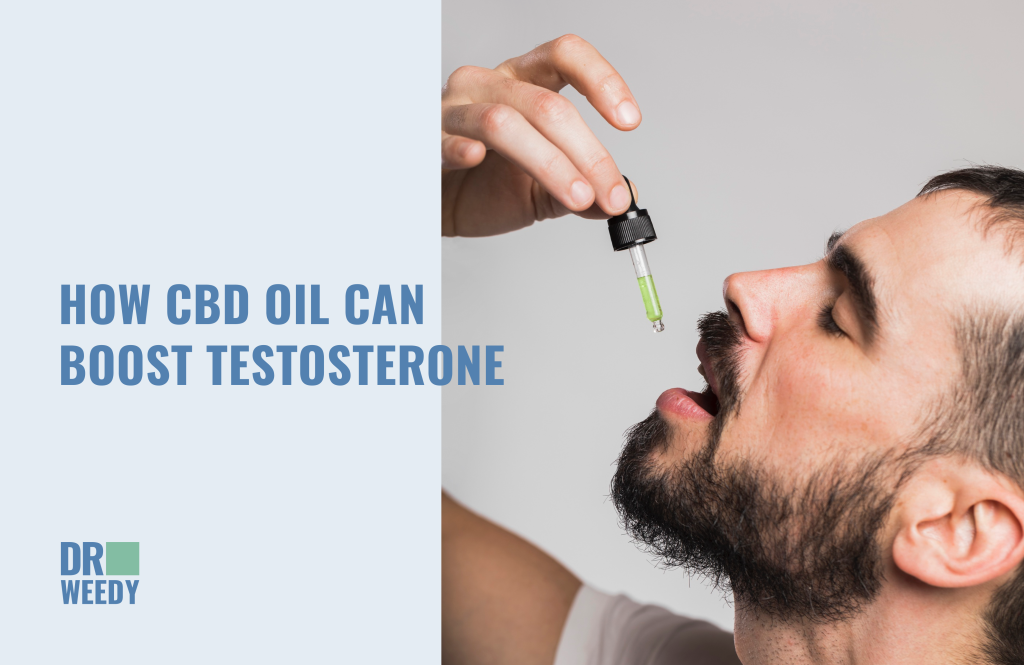
In 2019, the journal Human Reproduction featured a study by American scientists that linked marijuana consumption to the ECS’s performance. The research indicated that moderate CBD doses positively influenced sperm concentration and count in men while elevating testosterone levels.
Researchers from the Harvard School of Public Health and Harvard Medical School, under Jorge Chavarro’s leadership, assembled a control group of 662 men (average age 36.3) for a study spanning 2000 to 2017. On average, participants smoked two CBD cigarettes weekly.
Contrary to their initial hypothesis that marijuana would negatively affect the male reproductive system, the study revealed the opposite. Marijuana consumers, either current or past, had a 28% higher sperm count than those who never used marijuana. Furthermore, marijuana users also exhibited higher testosterone levels.
Another study in 2017, involving 2,000 men, showed that current cannabis users had an average testosterone level of 4.27 ng/mL, whereas non-users had levels averaging at 3.6 ng/mL.
Using CBD to Elevate Testosterone Levels
While exact mechanisms are still under investigation, CBD potentially enhances testosterone production in several ways:
- Stress Reduction: Chronic stress leads to heightened cortisol, which can impede testosterone synthesis. CBD’s calming effects may reduce stress, fostering a hormonal balance conducive to testosterone production.
- Anti-Inflammatory Properties: Inflammation can contribute to dwindling testosterone levels. CBD’s anti-inflammatory attributes could indirectly bolster testosterone production.
- Sleep Enhancement: Optimal testosterone synthesis requires quality sleep. CBD may promote deeper, rejuvenating sleep, resulting in better testosterone balance.
- Regulating Blood Sugar: Stable blood sugar levels are vital for testosterone health. Preliminary findings suggest CBD could stabilize insulin and blood sugar levels, indirectly supporting testosterone.
- Direct Impact on Testicular Health: Preliminary research indicates CBD might influence Leydig cells, which generate testosterone in the testicles.
Can CBD Lower Testosterone Levels?
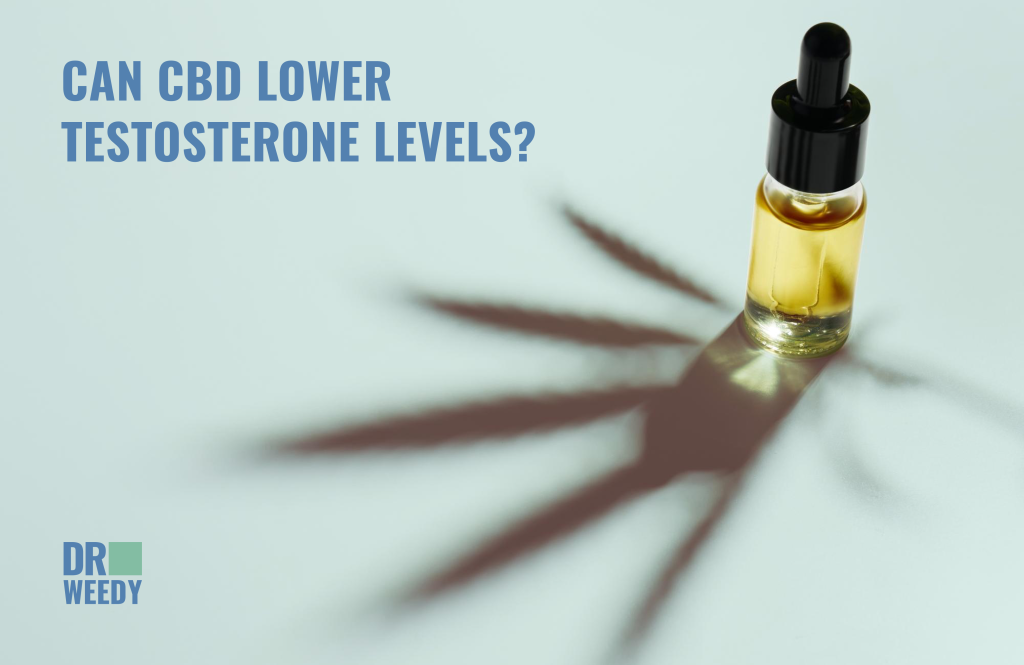
Some studies have reported a decline in testosterone levels due to high CBD doses in marijuana cigarettes. Excessive daily consumption had detrimental effects: initial decreases in motile sperm, followed by a reduction in overall sperm count.
The takeaway? Dosage is paramount. The correlation between CBD’s positive effects on testosterone and the appropriate dosage is no longer speculative; it’s a proven axiom, as evidenced in the 1970s.
In 1974, Robert Kolodny found that frequent marijuana users had diminished testosterone levels compared to occasional users. Notably, all users, regardless of frequency, exhibited a temporary drop in testosterone immediately post-smoking.
CBD and Testosterone – What’s the Verdict?
For decades, marijuana has faced a plethora of accusations: promoting aggression, violence propensity, increased crime rates, and drug addiction. Such claims lack empirical evidence. CBD’s impact should be gauged on scientifically verified data.
Moderate marijuana usage may yield benefits such as:
- Calming effects
- Reduced blood pressure and chronic pain relief
- Alleviation of insomnia and enhanced sleep quality
- Diminished anxiety and stress
- Elevated brain serotonin levels, improving mood
- Heightened sensitivity and sexual desire
The intersection of CBD and testosterone is informed by science-backed research. Marijuana users can amplify the advantages of CBD without adversely affecting their testosterone levels.
Considerations for Boosting Testosterone Levels with CBD
CBD’s potential health benefits have garnered considerable attention in recent years. Its potential role in aiding testosterone production is especially intriguing. If you’re contemplating integrating CBD to boost testosterone levels, here are some recommendations:
- Optimal Dosage: Commence with a modest CBD dose and adjust based on your body’s response.
- Consistent Usage: Regular CBD consumption may yield better results than occasional use.
- Quality Products: Prioritize high-caliber, third-party tested CBD products.
- Combine with a Healthy Lifestyle: Complement CBD intake with a nutritious diet, exercise, and ample sleep for the best testosterone outcomes.
- Monitor and Reflect: Maintain a journal to track any perceptible changes after CBD initiation.
- Consultation: Consult a healthcare expert before modifying your CBD intake, especially if you’re on other medications or have underlying health conditions.
By embedding CBD within a holistic health regimen, you can potentially leverage its benefits to optimize testosterone production.
























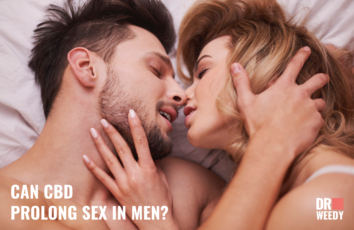
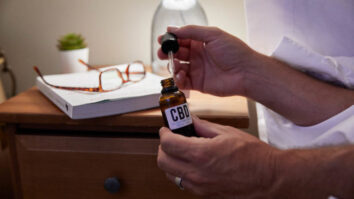
Hello AZJJ,
Thank you for taking the time to engage with our article on CBD and Testosterone. We appreciate your insightful comment and would like to clarify some points.
You’re absolutely correct in distinguishing CBD from regular cannabis smoking, especially concerning THC’s estrogenic effects on testosterone levels. CBD, devoid of THC, indeed offers a different interaction with the endocannabinoid system (ECS).
Regarding your curiosity about the potential effects of a mixture of CBD flower and high-THC cannabis, it’s a complex interaction that depends on various factors, including individual sensitivity and the specific ratios of CBD to THC. While some studies have shown that moderate CBD doses can positively influence sperm concentration and testosterone levels, the effects of combining CBD with high-THC cannabis may vary among individuals.
It’s important to note that the research on this specific combination is limited, and individual responses may differ. Additionally, the ideal dosage plays a crucial role, as excessive consumption of THC has been associated with detrimental effects on testosterone levels.
In summary, while CBD has shown potential benefits in supporting testosterone production, the interaction with high-THC cannabis is not fully understood, and individual responses may vary. If you are considering such a combination, we recommend starting with modest doses, closely monitoring your body’s response, and consulting with a healthcare professional for personalized advice.
We hope this response addresses your inquiry. If you have further questions or need more information, feel free to ask.
Best regards,
Dr.Weedy Team 🌱
Article seems to confuse CBD with regular cannabis smoking. I understand that THC, obviously present in regular weed (not CBD flower) is estrogenic and will reduce testosterone levels… while CBD (with no THC) is not estrogenic and can increase T levels.
I wonder if a mixture of CBD flower and regular weed (high THC, very low CBD) might cancel out each others effects on testosterone…??